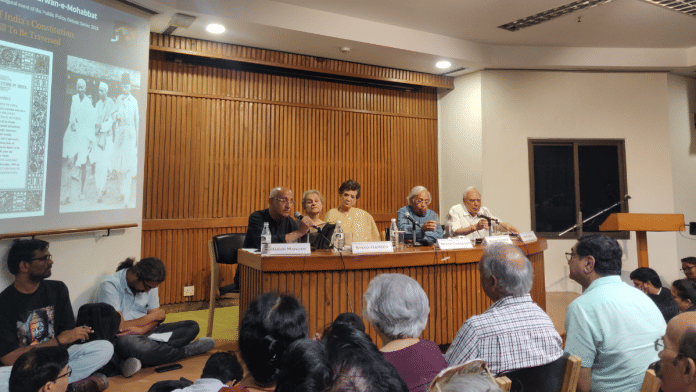It felt like a room of resistance at Delhi’s India International Centre when cotton kurta, saree-clad anti-government lawyers, poets, and activists urged the masses to rise like a tsunami – even as they pleaded helplessness themselves.
They all agreed on one thing–politics cannot save the country, neither can the judiciary nor can any of the existing institutions. It is only the people who can uphold the basic ethics and morality of the Indian Constitution.
The occasion was the first lecture in the ‘Public Policy Debate Series’, organised in collaboration with the Centre for Equity Studies recently. The lecture was titled ‘The Morality of India’s Constitution: The Path Still to be Traversed’.
The discussion was chaired by author, activist and researcher Harsh Mander, with panellists Syeda Hameed, social and women’s rights activist; Neera Chandoke, Distinguished Fellow, Centre for Equity Studies; Kapil Sibal, former Union Minister; and Ashok Vajpeyi, poet and cultural and arts administrator.
The event saw journalists scribbling notes laden with charged words on the state of India’s democracy and the country’s culture of hate, young lawyers with eyes glued to their laptops, drafting petitions but ears focused on the speakers, and attendees dutifully smiling, clapping, laughing and gasping at every word uttered.
There were mentions of the violence in Manipur and Haryana’s Nuh, the incident involving gunning down of four people on a Jaipur-Mumbai train by a Railway Protection Force (RPF) constable, the lack of debates in Parliament, the pendency of important cases in the Supreme Court, the three proposed criminal laws, as well as the Enforcement Directorate (ED) and the Central Bureau of Investigation (CBI). There was a sense of doom, with calls to “reclaim” the morality of our Constitution.
Also read: 12,000 yrs, 101 chapters and one question—How many pasts does India have?
‘We are living in the dark’
Sibal was the star attraction. He spoke of the moral underpinnings of the Constitution, asserting that they were set out in the Preamble, and how “we all have moved far away from them.”
He then launched a swift attack on the state of democracy in India, with only subtle hints at those allegedly responsible. “There is no political justice in this country. People cry for social justice. The economy of the country is being run by a couple of people, so there is no economic justice. We are living, if I want to believe somebody, in Amrit Kaal,” he said, evoking laughter and recognition from the audience, who were quick to put two and two together and link Sibal’s reference to Modi government’s claim of India entering its ‘golden era’.
“We are living in the dark. That’s what the reality is,” added Sibal, vehemently disagreeing with Modi’s claims. He then listed examples to show “what’s happening in the country” –from no debates in Parliament, the fall of elected governments in states, to the three new proposed criminal laws.
“Let’s not fool ourselves; we’re not living in a democracy. And if you add that with a culture of hate, it’s an entirely different brew. So where do we go from here?” he asserted. “I blame ourselves; we sit here, we have debates, but we’re not willing to stand up. Which middle-class person is willing to stand up? Nobody. I find it difficult for lawyers to stand up because everybody feels that why should I be the one to speak my mind. If you don’t speak your mind, then you’ll see what is happening in our country.”
Sibal’s solution? Rise up. “It’s the people who will decide what’s going to happen. And once the people are in a position that they feel that there is nothing else we can do except to change this, then only change will come.”
While he lends his support to the INDIA opposition alliance outside the auditorium, inside the auditorium he said that, “no political party has the capacity to change the system, given the fact that every institution in this country is completely captured and the real issues before the court are not being heard.”
A similar solution was offered by the other speakers as well. For instance, Hameed said that the happenings in Manipur and Nuh are “rock bottom”, adding, “what is unfolding in the future is also the rock bottom”. She then asserted, “The other speakers also spoke about what is the road ahead. What the road ahead is, we’ll have to rise like a Tsunami.”
Also read: Shabana Azmi to Naseeruddin Shah, how Bollywood stars breathed life into Delhi’s theatre scene
Middle class destroying India
The evening was also a concoction of nostalgia around poetry and revolution, hallmarks of India’s freedom struggle. The stage for this was set by Chandoke, the first speaker, who spoke of how the three Kapoors – Prithviraj, Raj, and Shammi – as well as the “debonair Devanand”, all took to the streets in 1946 when the Indian People’s Theatre Association (IPTA) took out a procession against the communal riots in what was then Bombay.
“All [were] marching, saying ‘please bring an end to this bloodshed’. Today, when have we seen this procession?” she asked. She also spoke about how Urdu is regarded as “an enemy language” now.
When she handed the baton to Sibal, the second speaker, he couldn’t resist letting his creativity flow too. “I am not a poet, but I also write some lines,” he said, before reciting a poem to “waah waahs” and “kya baat hais” from the audience.
Vajpeyi, the only real bard in the gathering, weaved his opinion into poetry. Speaking mostly in Hindi, he blamed the middle class for bringing ruin to India.
“The middle class is bent on destroying this country. The biggest support these forces are getting is from this middle class only.”
He placed the onus squarely on the people to protect the Constitution. “We should not trust institutions that much now. Rather, citizens should rise by becoming an institution in themselves…how that will happen, I don’t know.”
(Edited by Zoya Bhatti)






